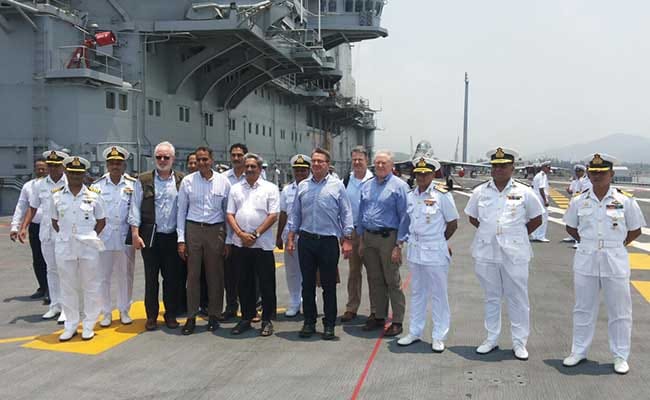
US Defense Secretary Ashton Carter and Defence Minister Manohar Parrikar aboard the INS Vikramaditya.
The United States and India are close to a breakthrough on a defense logistics deal that has taken more than a decade to negotiate, a reflection of closer ties as China's military muscle grows.
The so-called Logistics Support Agreement will be signed in a matter of weeks, U.S. Defense Secretary Ash Carter told reporters in New Delhi on Tuesday. The deal, first proposed in 2004, allows for cashless transactions for services such as refueling for military vehicles, aircraft and warships.
"All issues on the logistics agreement have been resolved," Carter said in a briefing alongside Indian counterpart Manohar Parrikar.
India and the U.S. are strengthening defense ties as China increases its assertiveness in waterways throughout the Asia-Pacific region. The Obama administration also sees India as a large market for military goods, and Prime Minister Narendra Modi is looking to attract arms makers to create manufacturing jobs.
India and the U.S. plan to start dialogues on maritime security and submarine technology, Parrikar said on Tuesday. The two sides will also continue cooperation on a new aircraft carrier as part of efforts to integrate high-technology Indian companies into the global supply chain, he said.
"I'm confident that the India-U.S. relationship will be one of the key global partnerships of this century," Parrikar said. "Defense cooperation is a central pillar of India's multi-faceted relationship with the U.S."
While the logistics deal is close, neither side mentioned two other so-called "foundational agreements" that have been under discussion for almost as long, which cover communications interoperability and geospatial cooperation. Both would allow the U.S. to sell India more advanced military technology -- particularly in fighter jets, where India has a pressing need.
It would be feasible for Lockheed Martin Corp. to set up an F-16 assembly line if about 100 jets are to be produced for the Indian Air Force and for possible exports, Abhay Paranjape, a director for business development, said in an interview last month.
About one third of the country's air fleet is more than 40 years old and set to retire in the next decade, putting pressure on Modi to quickly acquire new warplanes to keep pace with neighbors China and Pakistan. Last year he scaled down a plan to buy 126 Rafale warplanes from Dassault Aviation SA to 36 jets after disagreements over the price.
Carter on Tuesday reiterated plans to help India develop jet-engine technology.
"Efficiently moving forward on a fighter jet to be manufactured in India can be a feather in the cap of the current government from a defense perspective," said Anurag Garg, director at PwC Strategy& in India. "With three years left in the current Modi government's term, the race is definitely on."
© 2016 Bloomberg L.P.
(This story has not been edited by NDTV staff and is auto-generated from a syndicated feed.)
The so-called Logistics Support Agreement will be signed in a matter of weeks, U.S. Defense Secretary Ash Carter told reporters in New Delhi on Tuesday. The deal, first proposed in 2004, allows for cashless transactions for services such as refueling for military vehicles, aircraft and warships.
"All issues on the logistics agreement have been resolved," Carter said in a briefing alongside Indian counterpart Manohar Parrikar.
India and the U.S. are strengthening defense ties as China increases its assertiveness in waterways throughout the Asia-Pacific region. The Obama administration also sees India as a large market for military goods, and Prime Minister Narendra Modi is looking to attract arms makers to create manufacturing jobs.
India and the U.S. plan to start dialogues on maritime security and submarine technology, Parrikar said on Tuesday. The two sides will also continue cooperation on a new aircraft carrier as part of efforts to integrate high-technology Indian companies into the global supply chain, he said.
"I'm confident that the India-U.S. relationship will be one of the key global partnerships of this century," Parrikar said. "Defense cooperation is a central pillar of India's multi-faceted relationship with the U.S."
While the logistics deal is close, neither side mentioned two other so-called "foundational agreements" that have been under discussion for almost as long, which cover communications interoperability and geospatial cooperation. Both would allow the U.S. to sell India more advanced military technology -- particularly in fighter jets, where India has a pressing need.
It would be feasible for Lockheed Martin Corp. to set up an F-16 assembly line if about 100 jets are to be produced for the Indian Air Force and for possible exports, Abhay Paranjape, a director for business development, said in an interview last month.
About one third of the country's air fleet is more than 40 years old and set to retire in the next decade, putting pressure on Modi to quickly acquire new warplanes to keep pace with neighbors China and Pakistan. Last year he scaled down a plan to buy 126 Rafale warplanes from Dassault Aviation SA to 36 jets after disagreements over the price.
Carter on Tuesday reiterated plans to help India develop jet-engine technology.
"Efficiently moving forward on a fighter jet to be manufactured in India can be a feather in the cap of the current government from a defense perspective," said Anurag Garg, director at PwC Strategy& in India. "With three years left in the current Modi government's term, the race is definitely on."
© 2016 Bloomberg L.P.
(This story has not been edited by NDTV staff and is auto-generated from a syndicated feed.)
Track Latest News Live on NDTV.com and get news updates from India and around the world

